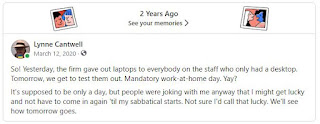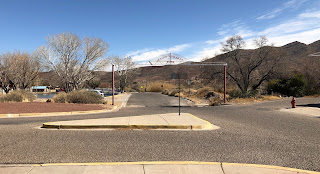I guess that by posting tonight, I'm competing with the Academy Awards. So I might as well talk about the thing everybody's going to be talking about anyway. No, not Will Smith smacking Chris Rock for dissing his wife. I mean movies in general.
A Facebook friend posted earlier today that he hadn't seen any of this year's ten Best Picture nominees because he has trouble hearing these days, so he waits for them to come to the small screen. I couldn't help but wonder where he's been. I've seen six of them -- and I saw them all via one streaming service or another.
 |
| SergeyNivens | Deposit Photos |
Writing in the New York Times earlier this week, Ross Douthat claimed that the Oscars are losing relevance because the movies they're meant to honor are slowly disappearing: "The ideal Oscar nominee is a high-middlebrow movie, aspiring to real artistry and sometimes achieving it, that’s made to be watched on the big screen, with famous stars, vivid cinematography and a memorable score. It’s neither a difficult film for the art-house crowd nor a comic-book blockbuster but a film for the largest possible audience of serious adults..." His emphasis is on the big screen experience. He laments that almost nobody went to see the nominees in theaters this year; "Spider Man: No Way Home" (which, by the way, I also saw via streaming) has earned four times the U.S. box-office take of all ten nominees combined.
Douthat goes on to suggest, among other things, that fans of Seeing Serious Cinema at the Cinema recognize that the art form needs their patronage, in the same way that fans of opera and ballet support those arts -- that is, classic movies should be shown in theaters more often, and students should be encouraged to study classic films the same way they study classic literature (never mind that they already do; "film studies" classes have been around for at least a couple of decades).
I think maybe Douthat is missing the point. The biggest reason people stopped going to the movies -- aside from the pandemic -- is that the experience has gone downhill. A moviegoer shells out big money for the ticket and bigger money for a snack, and is then surrounded by others who might chat through the show. And if your million-ounce soda goes through your system too fast, you can't hit the pause button while you go to the restroom. And then there's the lack of closed-captioning mentioned by my Facebook friend. Operas have gone to seat-back closed captions; if movie theaters want to lure older adults back, maybe they should do the same.
Or maybe we should just bow to the inevitable. I used to love going to the movies. When my kids were in high school, we had a tradition of attending midnight openings for movies like "Lord of the Rings" and the Harry Potter flicks. (The rule was they had to go to school the next day.) But ticket prices are in the stratosphere now, and the big screen experience truly isn't that much more engaging than watching a film at home.
Then again, I'm reminded that radio was supposed to be dead long since; way back in the '50s, TV was going to kill it off, or so everybody said. And yet radio, in one form or another, has stayed with us. I expect the movie business, too, will be with us for many years to come.
***
I'm taking another break next weekend. See you back here Sunday, April 10th.
***
These moments of cinematic blogginess have been brought to you, as a public service, by Lynne Cantwell. Get vaxxed!





